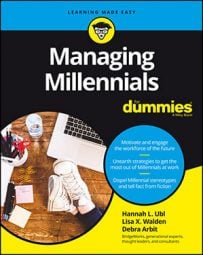When consulting with organizations, it becomes obvious that though leadership may think a mentorship program is in place, there are so few guidelines or such slight assistance in developing those mentorship relationships that employees don’t even try. They have no idea how or where to start. If you want to create a productive and celebrated mentorship program, you have it in you!
Without easily accessible guidelines and training, your mentorship program is in all likelihood lacking. It doesn’t matter what your website copy says or what you say to new employees. A handful of examples of successful mentor-mentee relationships does not a successful program make. Having some sort of structure is crucial, and for Millennials, the more prescriptive, the better.
Your mentors may want more freedom to define the relationship, because they’ll likely be the ones with the fuller plates, so it’s not a bad idea to allow them to have some level of autonomy in setting the specifications for what that relationship looks like.To ensure that the right people are matched up and that both are getting what they want out of the pairing, ask potential mentors and mentees to answer these questions:
- What is your desired outcome?
- What type of skills are you trying to improve?
- Do you have a personality or gender preference?
- What is the weekly or monthly time commitment you are willing to put in?
- How often do you want to meet?
- How often do you have access to the other? (For example, are Fridays the only good day? Do you never work in the office at the same time?)
- What is the preferred structure of the meeting (agenda-driven and formal, free-flow and informal, themed each time, long- or short-term goals, and so on)?
- Is there a company-prescribed model that each mentor/mentee can follow or use as a jumping-off point?
- When will you know that the learning has been accomplished and that it’s time to move on to another mentor/mentee?
Be as unambiguous as possible about the time allowance and access that Millennials will have to their mentor. Think about the kind of access they’ve had with their parents. It was basically all the time and any time. In the workplace, this type of access is improbable if not impossible. By setting clear expectations at the top of each relationship, and then later at the top of each meeting, you avoid overloading your mentor with the eager, info-hungry, and sometimes overbearing Millennial mentee.
As nice as it would be for mentors and mentees to naturally gravitate toward you, don’t hold your breath waiting for this to happen. A best practice is to inquire of every new hire whether she’s interested in a mentor and then utilize a member of the HR team to actively place this new hire with the appropriate mentor.
“I think it’s important to have an advocate for you in your career; someone higher up who can stand in your court, vouch for you, and pass on knowledge that they’ve acquired in their years in the working world. It’s tough because sometimes I find networking a bit awkward. If you’re going to have a mentor, it has to be with someone you click with — natural, relaxed, and someone you can trust.” —Alexa S., Millennial
